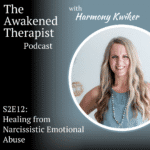
In this episode, Harmony explores the nuanced challenges of supporting clients who are experiencing emotional abuse in relationships with narcissistic partners. Rather than focusing solely on leaving the relationship, she emphasizes the importance of understanding the client’s unmet needs and adaptive survival strategies. By helping clients repair their attachment systems and become secure bases for themselves, therapists can support a healing process that may naturally lead to outgrowing unhealthy dynamics.
Harmony also speaks to the phenomenon of hyper-identification with attachment wounds and the importance of humanizing both individuals in abusive relationships—without bypassing accountability or safety.
In the extended teaching available on Patreon, Harmony shares practical insights and case studies that illustrate how to help clients move from a fawn response into a state of healthy vagal tone and empowered self-regulation.
Listen to the full episode and access bonus teachings here:
patreon.com/TheAwakenedTherapist
To learn more about our trainings, check us out here: https://awakenedtherapist.com/holistic-therapy-trainings/
Harmony Kwiker (kw-eye-ker), MA, LPC, NCC, ACS, is a psychotherapist, author, and visiting instructor at Naropa University where she teaches mindfulness-based transpersonal counseling. She is the founder of the Institute for Spiritual Alignment where she offers ongoing learning opportunities for therapists who are committed to awakening. Her first book, Reveal: Embody the True Self Beyond Trauma and Conditioning, is a vulnerable self-help memoir, and her second book, Align: Living and Loving from the True Self , and her third book, The Awakened Therapist: Spirituality, Consciousness, and Subtle Energy, is a text book. Her newest book, Holistic Co-Regulation: A Practitioner’s Guide to Working with Chronic Dysregulation, is now available.
Disclaimer: The episode you’re about to hear is intended for educational purposes only and this content should not be taken as supervision or clinical advice. Because each person is so unique, please consult your supervisor before attempting to apply any intervention from a theory you are not explicitly trained in.
